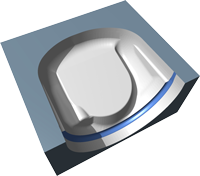VERICUT Verification
VERICUT verification makes detecting program mistakes and verifying part accuracy easy!
Verification is the foundation of the VERICUT product line and is required to run any of the other add-on modules. Superior Performance: VERICUT’s unique algorithm provides fast, accurate results. Performance does not degrade with increased cuts, so VERICUT can process programs with millions of cuts and virtually any type of material removal technique.
Base Verification verifies 3-axis milling and 2-axis turning (including multiple setup positions). The Multi-Axis module is required to detect collisions between the tool, stock and fixture for rotary 4 & 5-axis positioning/indexing motion. Add Multi-Axis to detect collisions during positioning and to remove material during continuous four and five axis milling, drilling, turning, and combination mill/turn operations.
Verification detects errors such as:
- Incorrect or misread blueprints
- Inaccurate programming
- Incorrect tool path motions
- Rapid motion contact
- Collisions with fixtures and clamps
- Tool shank and holder collisions
- CAD/CAM and post-processor bugs
Accurate Error Detection & Reporting
With more than two decades of development, VERICUT’s error-detection is extremely accurate. Errors are shown in the color of your choice – simply click on an error to see which tool path record is responsible. All errors are recorded in a results file. You can run simulations in batch mode and set VERICUT to record snapshots of all errors.
CNC Control Emulation & G-code Support
VERICUT accurately emulates CNC control logic. Each control in your shop can be accurately simulated to account for different types of machines, programs, parts, and functions. No special programming language is required to simulate most CNC controls.
- Allen-Bradley
- Mazatrol
- Bosch
- NumeriPath
- Cincinnati Milacron
- Okuma
- Fadal
- Phillips
- Fanuc
- Siemens
- General Electric
- Yasnac
- Heidenhain

Today’s NC machine tools process complex NC programs. VERICUT was designed by NC programmers and professionals in NC simulation and verification software. Because of this understanding and expertise, VERICUT is an excellent tool when using multi-axis machines, complex NC code, and/or advanced programming techniques.
You also get the flexibility to customize controls. Using pull down dialog boxes, G-code characters and numerals are defined in a logical “word/address” format, then configured to call CGTech action macros which simulate control functions. The control logic also supports conditional checks (other codes in the block, current variable values, machine states, etc.) that can alter how the word/address is interpreted.
VERICUT is designed to support advanced control functions including:
- Look-ahead or 3D cutter compensation
- Tool tip programming & tool length compensation
- Gage length reference point programming
- Canned cycles and fixture offsets
- Rotary axis pivot points
- Variables, subprograms, and macros, and macro b
- Subroutines, looping, and branching logic
Model Analysis
The Verification module enables you to view and analyze the geometry of the cut part. You can zoom, reverse, and rotate the model. Models can be cross-sectioned multiple times at any orientation, so you can check areas that would be impossible to see in a solid model (such as the intersection of drilled holes).
The X-Caliper™ tool measures thickness, volume, depth, gaps, distances, angles, hole diameters, corner radii, scallop height, and edges. Delta X, Y, Z component distance measurements are included.
Defining Stock & Simulating Cutting Tools
You can define stock models in VERICUT or import them from a CAD system. VERICUT supports multiple, independently moving stock models for multiple or staged setups. VERICUT simulates multiple simultaneous cutters. You can set up holders as “non-cutting” portions of the tool to check for collisions. VERICUT supports concave bottom, or non-center cutting end mills, such as carbide insert end mills, so you can take full advantage of your equipment without fear of destroying the workpiece or cutting tool because of an incorrect ramp motion.
Convert NC Data
The Verification module is also a powerful reverse post- processor. By translating NC programs to APT or other NC data formats, it saves valuable machine tool and programmer time and makes it possible to recycle obsolete or incompatible NC programs.

 Germany
Germany Italy
Italy USA
USA South Korea
South Korea UK
UK India
India France
France China
China Japan
Japan